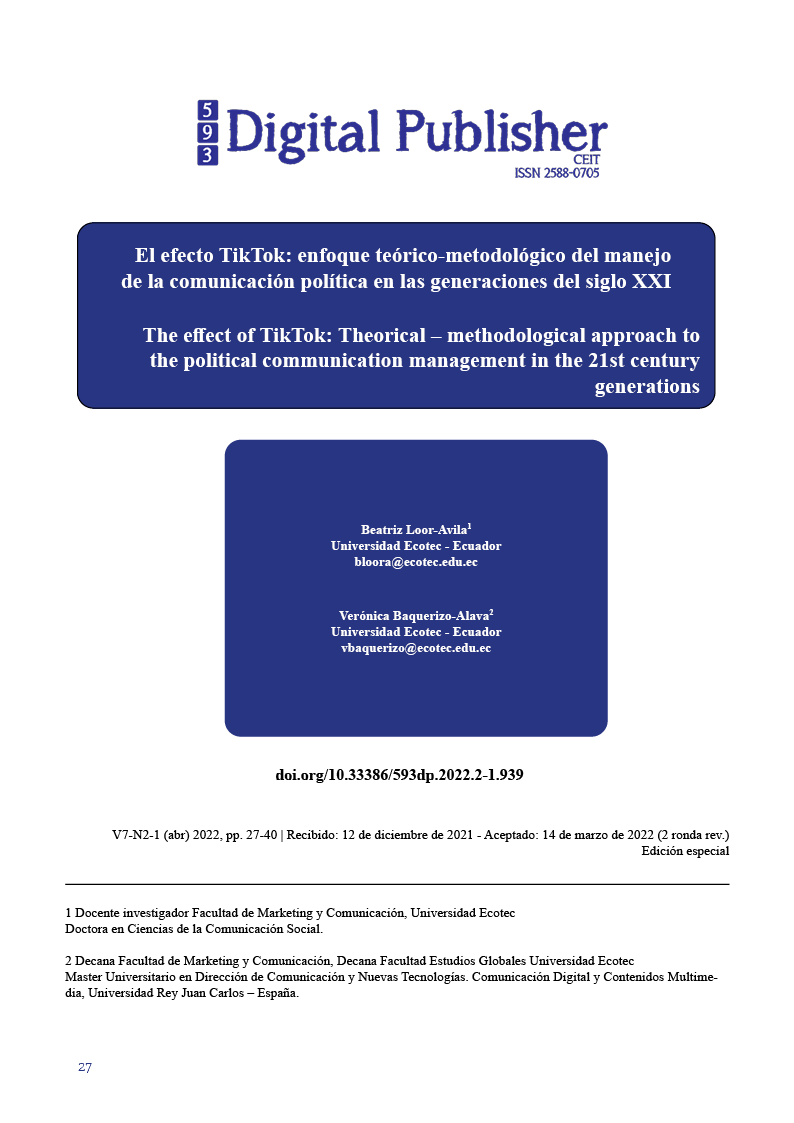The effect of TikTok: Theorical – methodological approach to the political communication management in the 21st century generations
Main Article Content
Abstract
The authors of this research analyze the incidence of digital communication platforms in the voting generations of the 21st century. Which leads to a new way of perceiving and managing political communication. The study focuses mainly on the social network TikTok and how the use and effect of this platform generated empathy and acceptance in the various sectors of the country. The main problem, a stance of rejection of the politics of exposing passive, superficial discourses, disconnected from the reality of youth, that still is presented as a problem, these traditional models and ambiguous sociocultural and political schemes that were the indicators to the demotivation and uninteresting of the voters and the question is formulated: What is the theoretical methodological approach that supports the use of the TikTok tool in the management of political communication in the new generations in Ecuador? For this reason, the need arises to present new communicational scenarios in the marketing of a modern policy, where the importance of social networks has gained strength through the generation of new content. The main objective is to analyze the impact of the Ecuadorian presidential political campaigns on young voters and users of TikTok. In Ecuador, for the presidential elections of 2021, several candidates made use of this platform, trying to communicate their government message through this means, as well as showing their activities carried out during the campaign period. The methodological approach based on the review of the literature considering that we are in a theoretical review investigation. All these antecedents provoke a new protagonist on the part of the new society, the TikTok effect, which through citizen participation, solidarity gives a clear example of building a better world with public policies that favor the new generations as the main protagonists of history.
Downloads
Article Details

This work is licensed under a Creative Commons Attribution-NonCommercial-ShareAlike 4.0 International License.
1. Derechos de autor
Las obras que se publican en 593 Digital Publisher CEIT están sujetas a los siguientes términos:
1.1. 593 Digital Publisher CEIT, conserva los derechos patrimoniales (copyright) de las obras publicadas, favorece y permite la reutilización de las mismas bajo la licencia Licencia Creative Commons 4.0 de Reconocimiento-NoComercial-CompartirIgual 4.0, por lo cual se pueden copiar, usar, difundir, transmitir y exponer públicamente, siempre que:
1.1.a. Se cite la autoría y fuente original de su publicación (revista, editorial, URL).
1.1.b. No se usen para fines comerciales u onerosos.
1.1.c. Se mencione la existencia y especificaciones de esta licencia de uso.
References
Altamirano, V. y Túñez, M. (2014). Promoción y Difusión Turística en Iberoamérica. Análisis de contenidos y herramientas utilizadas en portales web y redes sociales. VI Congreso Internacional Latina de Comunicación Social – VI CILCS – Universidad de La Laguna. Tenerrife, España.Andrade, F. (2019). Universidad de Guayaquil. Obtenido de http://repositorio.ug.edu.ec/bitstream/redug/41550/1/An%c3%a1lisis%20de%20la%20Comunicaci%c3%b3n%202.0%20en%20la%20Campa%c3%b1a%20Pol%c3%adtica%20Presidencial%20Ecuador-2017%20.pdf
Barquero, C. (2015). Comunicação estratégica. Madri: McGrawHill.
Briones, S. 2021 https://cromaclictv.com/tik-tok-la-estrategia-de-comunicacion-de-lasso/
Calderón, D., Enciso, G., y Arias, C. (2017). Manual de Marketing Político. Bogotá: Universidad Santo Tomás.
Campos. (2015). Digital Future in Focus Global 2015. Recuperado de https://www.comscore. Com/Insights/Presentations-and-Whitepapers/2015/2015-Global-Digital-Future-inFocus
Campos R. (2021) Adaptado de “Aprobación de los mandatarios América y el mundo” Ranking Mitofsky.
Carlsson, E., y Nilsson, B. (2016). Technologies of participation: Community news and social media in Northern Sweden. Journalism: Theory, Practice y Criticism, 17(8), 1113–1128. http://doi.org/10.1177/1464884915599948
Consejo Nacional Electoral - CNE (2021). Resultados Elecciones Generales en Ecuador primera vuelta 2021
CNE (2019). Elecciones seccionales de 2019. Obtidoemhttp://cne.gob.ec/es/?option=com_contentyview=articleylayout=edityid=4593 https://cromaclictv.com/tik-tok-la-estrategia-de-comunicacion-de-lasso/
Cruz, L. (26 de marzo de 2019). Merca 2.0. Obtenido de https://www.merca20.com/delmarketing-politico-tradicional-al-digital/
Durán Barba, Felipe Noguera, James L. Garnett, Hannia Vega, Roberto Izurieta. Ecuador Estado Digital (2021). Estadística de usuarios de redes sociales en Ecua-dor.
Ecuador Verifica. (2021). Ecuador Verifica. Obtenido de http://ecuadorverifica.org/2021/03/09/tiktok-campanas-electorales-ecuador/
Estrategias de Comunicación para Gobiernos. F.B.T. Quito-Ecuador. 2001. Washington D.C. junio 2001
El Universo. (24 de mayo de 2020). Hasta en TikTok los políticos buscarán los votos en Ecuador, COVID-19 cambia la estrategia electoral para elecciones 2021. El Universo.
Fernández, Y. (7 de abril de 2021). Xataja Basics. Obtenido de https://www.xataka.com/basics/que-tiktok-donde-viene-que-ofrece-red-socialvideos
Flores Garcés, Roger Danilo (2018)
URI: http://repositorio.puce.edu.ec:80/xmlui/handle/22000/18011
García, J. (2015). Marketing Político. Segovia: Universidad de Valladolid.
Hernández, C. (2019). Scielo. Obtenido de
http://www.scielo.org.mx/scielo.php?script=sci_arttextypid=S018519182019000100327
Howard, P., Savage, S., Flores-Saviaga, C., Toxtli, C. & Monroy Hernández, A. 2017. Redes Sociales, Compromiso Cívico Y La Hipótesis Del Slacktivismo: Lecciones De “El Bronco” De México.
Hujanen, J. (2016). Participation and the Blurring Values of Journalism. Journalism Studies, 17(7), 871–880.
Ibero. (1 de julio de 2020). Posgrados Ibero. Obtenido de https://blog.posgrados.ibero.mx/comunicacion-politica/ Baggionlini, L., & Castro, S. (24 de octubre de 2016). Universidad Nacional del Rosario. Obtenido de https://revistas.ort.edu.uy/inmediaciones-de-lacomunicacion/article/view/2621/2606
IAB Spain Marketing, IX Estudio de redes sociales 2018, s.p. Url: https://marketing4ecommerce.net/estudio-de-redes-sociales-espana-2018/Jordán, J., López, M., Soria, M., y Chasipanta, A. (2020). Factores integrales del marketing político. Análisis de redes sociales. 593 Digital Publisher CEIT, 5(2), 180-189.
Manosevitch, I., y Tenenboim, O. (2017). The Multifaceted Role of User-Generated Content in News Websites. Digital Journalism, 5(6), 731–752.
Nulty, Paul, Theocharis, Yannis , Popa, Sebastian Adrian , Parnet, Olivier and Benoit, Kenneth (2016) Redes sociales y comunicación política en las elecciones de 2014 al Parlamento Europeo. Estudios Electorales, 44. pp. 429-444. ISSN 0261-3794Peña, B. (2016).
Pulso Ciudadano (2021). Encuesta de intención del voto para primera vuelta Elecciones Generales en Ecuador 2021.
Sanz, M. (2019). Computer Hoy. Obtenido de https://computerhoy.com/reportajes/tecnologia/que-es-microtargeting-487077
Sánchez, S. (2020). Universidad de Valencia. Obtenido de https://www.researchgate.net/profile/Joao-Sousa-27/publication/351625196_Redes_sociais_online_exposicao_digital_e_cyberbullying_perfis_de_vulnerabilidade_de_universitarios_de_Cabo_Verde/links/60a22b5792851cfdf33ba6e1/Redes-sociais-online-exposicao-digital
Sánchez, C. (2017). Manual de Marketing Político. Colombia:
Ediciones USTA.
Van Dijck, J (2016), La cultura de la conectividad: Una historia critica de las redes sociales. Buenos Aires: Veitiuno Editores.
Villi, M., y Noguera-Vivo, J.-M. (2017). Sharing media content in social media: The challenges and opportunities of user-distributed content (UDC). Journal of Applied Journalism y Media Studies, 6(2), 207–223. http://doi.org/10.1386/ajms.6.2.207_1
Vives, M. (2020). Universidad de La Sabana. Obtenido de https://intellectum.unisabana.edu.co/bitstream/handle/10818/43403/Trabajo%20de%20grado%20Valentina%20Vives.pdf?sequence=1yisAllowed=y



